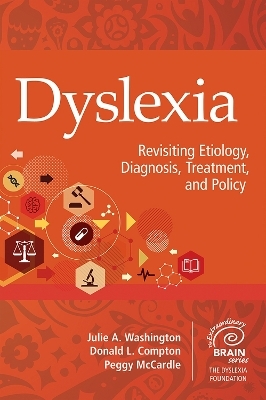
Dyslexia
Brookes Publishing Co (Verlag)
978-1-68125-361-9 (ISBN)
How do children develop reading skills—and when these skills don’t develop typically, how can we best identify challenges and intervene? Find the answers in this comprehensive volume on dyslexia: its root causes, the most effective methods of diagnosis and treatment, and the sociopolitical factors that affect intervention. Based on presentations from the seventeenth Extraordinary Brain Symposium, this book brings together contributions from more than 50 top researchers and practitioners, who explore critical topics such as:
• Early identification of children at risk for reading difficulty
• The use of neuroimaging and molecular genetics to better understand the origins of dyslexia
• The unique challenges to dyslexia assessment and intervention in developing countries
• Important insights from computer-based simulations of developmental dyslexia
• The impact of race, poverty, and linguistic differences on the accurate diagnosis of dyslexia
• The current state of teacher preparation programs
• Key considerations related to universal screening tools
• How to scale up evidence-based interventions for reading disorders
An essential resource for researchers, graduate students, and reading specialists, this book is an authoritative synthesis of what we know about dyslexia—and what we need to know to provide better supports for struggling readers.
Julie A. Washington, Ph.D., Professor, Special Education and Communication Disorders, Department of Educational Psychology, Georgia State University, Atlanta, Georgia Dr. Julie A. Washington is a professor in the Department of Educational Psychology, Special Education and Communication Disorders at Georgia State University. Her research focuses on improving understanding of the relationship between language variation and literacy learning in African American children growing up in poverty. Donald L. Compton, Ph.D., Professor and Chair, Special Education Department, Peabody College, Vanderbilt University, Nashville, Tennessee. Donald L. Compton is a professor and chair of the Special Education Department and a John F. Kennedy Center Investigator at Peabody College, Vanderbilt University. His research involves modeling individual differences in the development of children's reading skills and the identification of children with reading disabilities. Peggy McCardle, Ph.D., M.P.H., Owner, Peggy McCardle Consulting, LLC, Seminole, Florida Peggy McCardle is a private consultant and an affiliated research scientist at Haskins Laboratories. She is the former chief of the Child Development and Behavior Branch of the Eunice Kennedy Shriver National Institute of Child Health and Human Development (NICHD), U.S. National Institutes of Health, where she also directed the Language, Bilingualism, and Biliteracy Research Program and developed various literacy initiatives. Dr. McCardle is a linguist, a former speech-language pathologist, and, in her remote past, a classroom teacher. Her publications address various aspects of public health and developmental psycholinguistics. The recipient of various awards for her work in federal government, including a 2013 NICHD Mentor Award, she also was selected in 2013 to receive the Einstein Award from The Dyslexia Foundation. Her publications address various aspects of public health and developmental psycholinguistics (e.g., language development, bilingualism, reading, learning disabilities). Dr. McCardle has taught scientific and technical writing and has extensive experience developing and coediting volumes and thematic journal issues.
| Erscheinungsdatum | 31.10.2019 |
|---|---|
| Reihe/Serie | Extraordinary Brain |
| Verlagsort | Baltimore |
| Sprache | englisch |
| Maße | 157 x 231 mm |
| Gewicht | 558 g |
| Themenwelt | Geisteswissenschaften ► Psychologie ► Biopsychologie / Neurowissenschaften |
| Sozialwissenschaften ► Pädagogik ► Allgemeines / Lexika | |
| Sozialwissenschaften ► Pädagogik ► Bildungstheorie | |
| Sozialwissenschaften ► Pädagogik ► Sonder-, Heil- und Förderpädagogik | |
| ISBN-10 | 1-68125-361-5 / 1681253615 |
| ISBN-13 | 978-1-68125-361-9 / 9781681253619 |
| Zustand | Neuware |
| Informationen gemäß Produktsicherheitsverordnung (GPSR) | |
| Haben Sie eine Frage zum Produkt? |
aus dem Bereich


